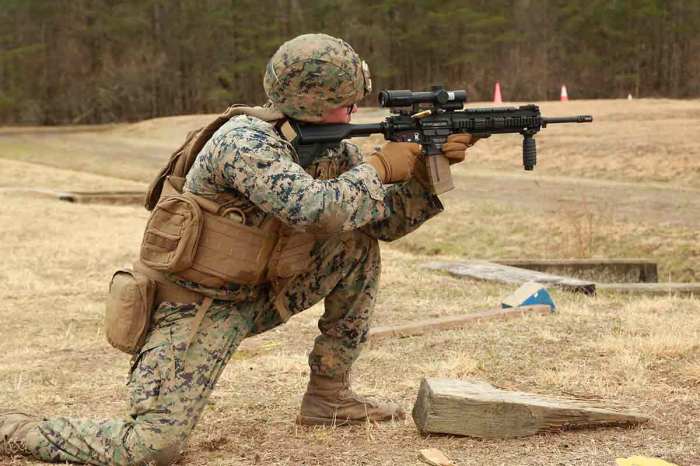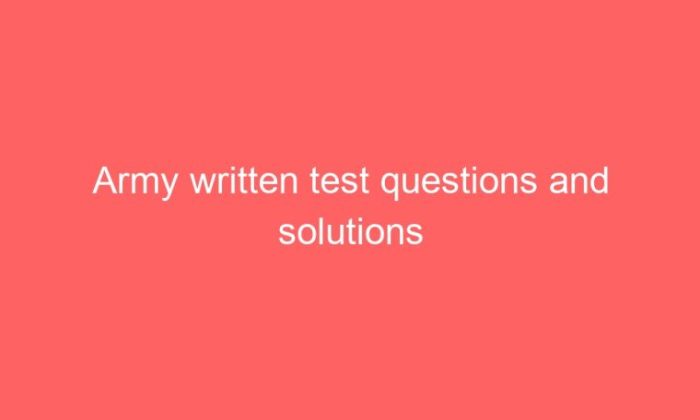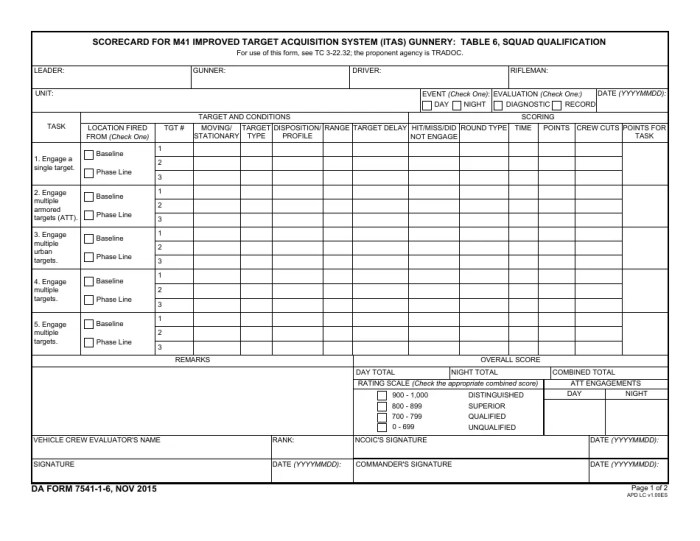Army iwq written test answers – The Army IWT Written Test, a crucial milestone in your military journey, presents an exciting opportunity to showcase your knowledge and skills. This comprehensive guide will equip you with everything you need to conquer this challenge, from understanding the test format to developing effective study strategies.
Embark on this journey of preparation, and emerge as a confident and well-prepared test-taker, ready to excel in the Army IWT Written Test.
Introduction

The Army IWT Written Test is an integral component of the Individual Weapons Training (IWT) process within the United States Army. It serves as a comprehensive assessment tool designed to evaluate soldiers’ knowledge and understanding of weapons systems, safety protocols, and tactical procedures.
The test encompasses a wide range of topics related to weapon handling, marksmanship principles, and combat operations.
Purpose and Significance
The Army IWT Written Test plays a crucial role in ensuring the proficiency and readiness of soldiers in handling and employing their weapons effectively. It assesses their theoretical knowledge and understanding of weapon systems, enabling them to make informed decisions and execute tactical maneuvers safely and efficiently.
Moreover, the test serves as a baseline for identifying areas where soldiers require additional training or support, contributing to the overall enhancement of their combat readiness.
Content Analysis
The Army IAW Written Test covers a wide range of topics relevant to the military profession and leadership. The test format includes various types of questions, each designed to assess specific knowledge and skills.
Types of Questions
- Multiple Choice:Presents a question with several possible answers, from which the test-taker selects the most appropriate.
- True/False:Requires the test-taker to determine if a given statement is true or false.
- Essay:Asks the test-taker to write a short essay on a specific topic, demonstrating their understanding and ability to articulate their thoughts.
- Short Answer:Requires the test-taker to provide concise answers to specific questions, testing their knowledge and recall.
- Fill-in-the-Blank:Presents a statement with missing words or phrases that the test-taker must fill in, assessing their knowledge of specific concepts.
Topics Covered
- Leadership and Management:Principles and practices of effective leadership, including motivation, communication, and decision-making.
- Military History:Key events, battles, and strategies from military history, both domestic and international.
- Military Law:Legal framework and principles governing military operations and conduct.
- Ethics and Values:Ethical considerations and values that guide military personnel in their actions.
- Technology and Weapons:Knowledge of military technology, weapons systems, and their capabilities.
- Current Events:Understanding of contemporary military affairs and global security issues.
Difficulty Level and Complexity
The difficulty level and complexity of the questions vary depending on the topic and question type. Multiple choice questions typically range from easy to moderate difficulty, while essay questions and fill-in-the-blank questions can be more challenging.
Knowledge and Skills Required
To successfully answer the questions, test-takers need a solid foundation in military knowledge, including leadership principles, military history, law, and ethics. They should also possess strong analytical and critical thinking skills, as well as the ability to recall and apply information in a timely manner.
Study and Preparation
To excel in the Army I/W Written Test, strategic preparation is crucial. Begin by familiarizing yourself with the test format and content. Utilize various study techniques to enhance your understanding and retention.
Effective Study Methods
- Spaced Repetition:Review material at increasing intervals, reinforcing memories.
- Active Recall:Test yourself regularly without notes, improving comprehension and retrieval.
- Chunking:Break down information into smaller, manageable units for easier memorization.
- Interleaving:Mix up different topics while studying, enhancing retention and reducing boredom.
- Pomodoro Technique:Alternate focused study sessions with short breaks, maintaining focus and productivity.
Understanding Question Types and Content
The test comprises various question types, including multiple choice, true/false, and essay. Familiarize yourself with the specific instructions and scoring criteria for each type.
- Multiple Choice:Carefully read the question and all answer options before selecting the best answer.
- True/False:Determine the veracity of the statement and select the appropriate option.
- Essay:Develop well-structured responses that demonstrate your understanding and analytical skills.
Recommended Resources and Materials
Leverage a variety of resources to enhance your preparation:
- Official Study Guide:Provided by the testing organization, this guide contains essential information and practice questions.
- Practice Tests:Simulate the actual test experience and identify areas for improvement.
- Online Courses:Guided instruction and interactive exercises can supplement your self-study.
- Subject-Specific Books:Review textbooks or online materials to reinforce your knowledge in specific content areas.
- Study Groups:Collaborate with peers to share insights, ask questions, and reinforce concepts.
Test-Taking Strategies

In the highly competitive Army I&W Written Test, effective test-taking strategies can significantly enhance your performance. By mastering efficient time management and question-answering techniques, you can maximize your score and increase your chances of success.
To optimize your time management, allocate a specific amount of time to each question or section. Prioritize questions based on their difficulty and potential points. Don’t spend excessive time on challenging questions; mark them for later review if time permits.
For the army iwq written test answers, you might want to check out the afi 1-1 air force standards as well. They have some great information that could be helpful for your test preparation. Let me know if you have any other questions about the army iwq written test answers.
Handling Challenging Questions
When faced with challenging or ambiguous questions, don’t panic. Read the question carefully and identify the key concepts. Break down the question into smaller, manageable parts. If necessary, rephrase the question in your own words to clarify its intent.
Use the process of elimination to rule out incorrect answer choices. Consider the plausibility and consistency of each option. If you’re still unsure, make an educated guess and mark the question for review later.
Avoiding Pitfalls and Mistakes
To avoid common pitfalls, carefully read the instructions and ensure you understand the question format. Don’t make assumptions or fill in gaps with your own interpretations. Answer questions directly and concisely, providing only the information requested.
Avoid careless mistakes by proofreading your answers before submitting them. Check for any errors in grammar, spelling, or calculations. If possible, have a friend or family member review your answers for clarity and accuracy.
Sample Questions and Answers: Army Iwq Written Test Answers

To enhance your preparation, we present sample questions from various topics, along with detailed answers and explanations. These questions are categorized by difficulty level and topic to guide your studies effectively.
Multiple Choice, Army iwq written test answers
Multiple choice questions test your ability to recognize and select the correct answer from a set of options. Here’s an example:
- Question:Which of the following is the capital of France?
- Options:
- London
- Berlin
- Paris
- Rome
- Answer:Paris
- Explanation:Paris is the capital and largest city of France.
True/False
True/False questions require you to determine whether a statement is true or false. Consider the following example:
- Question:The Great Wall of China is the longest wall in the world.
- Options:
- True
- False
- Answer:True
- Explanation:The Great Wall of China is estimated to be 13,171 miles long, making it the longest wall in the world.
Short Answer
Short answer questions ask you to provide a concise and accurate answer to a specific question. Here’s an example:
- Question:Name the first president of the United States.
- Answer:George Washington
- Explanation:George Washington was unanimously elected as the first president of the United States in 1789.
Essay
Essay questions assess your ability to analyze, synthesize, and communicate your knowledge. An example of an essay question is:
- Question:Discuss the causes and consequences of the American Civil War.
- Answer:
Causes:
- Slavery
- Economic differences between the North and South
- Political tensions
Consequences:
- Abolition of slavery
- Preservation of the Union
- Significant loss of life and economic damage
Additional Resources

Enhance your preparation for the Army IWW Written Test by exploring the following resources:
Expand your knowledge and understanding of the test format, content, and strategies with these valuable sources.
Websites
- Official Army IWW Website: www.goarmy.com/careers-and-jobs/find-your-job/army-intelligence-analyst.html
- Army Knowledge Online (AKO): https://www.us.army.mil/learn/knowledge-online/
- Army Career and Alumni Program (ACAP): https://acap.army.mil/
Books
- Army Intelligence Analyst Study Guide: https://www.amazon.com/Army-Intelligence-Analyst-Study-Guide/dp/1508832209
- Military Intelligence Analyst Study Guide: https://www.amazon.com/Military-Intelligence-Analyst-Study-Guide/dp/1507745730
- Army Intelligence Analyst Handbook: https://www.amazon.com/Army-Intelligence-Analyst-Handbook-Edition/dp/1499668759
Online Courses
- Intelligence Analyst Course: https://www.coursera.org/specializations/intelligence-analyst
- Army Intelligence Analyst Training: https://www.ed2go.com/army-intelligence-analyst-training
- Intelligence Analysis Certificate Program: https://www.pennstateonline.psu.edu/programs/intelligence-analysis-certificate
Contact Information
For further assistance or inquiries, contact:
- Army IWW Test Administrator: [email protected]
- Army Career Counselor: www.goarmy.com/careers-and-jobs/find-your-job/army-intelligence-analyst.html
Official Website Links
- Army IWW Test Information: https://www.goarmy.com/careers-and-jobs/find-your-job/army-intelligence-analyst.html
- Army IWW Test Updates: https://www.us.army.mil/learn/knowledge-online/
Key Questions Answered
What types of questions can I expect on the Army IWT Written Test?
The test covers a range of topics, including military knowledge, problem-solving, and critical thinking.
How can I effectively prepare for the test?
Utilize study resources, practice sample questions, and seek guidance from experienced mentors.
What are some common mistakes to avoid during the test?
Avoid rushing through questions, carefully read instructions, and manage your time wisely.